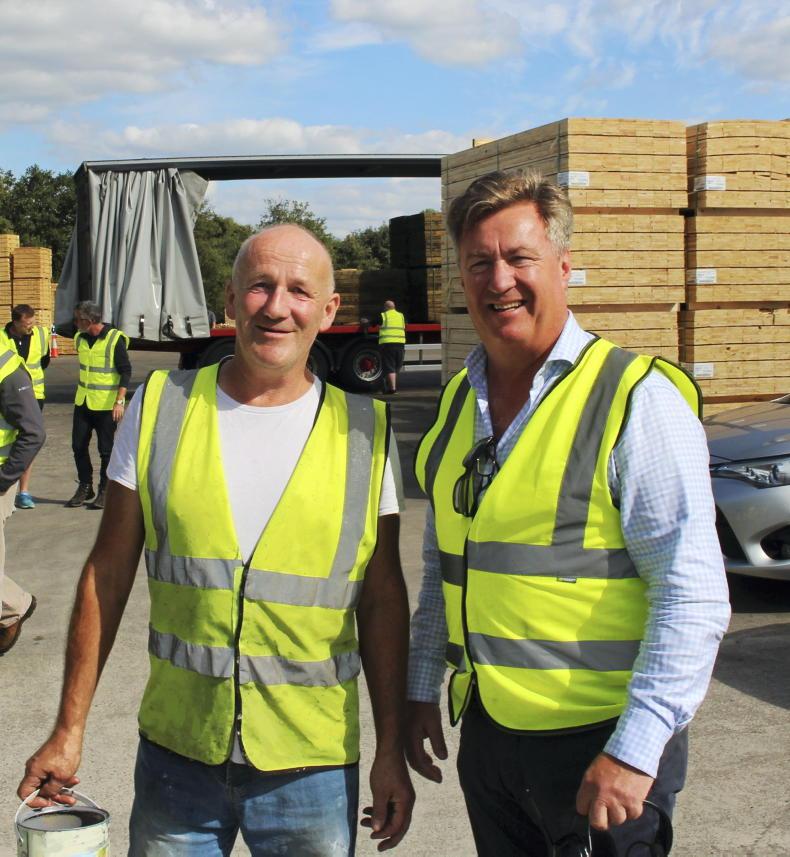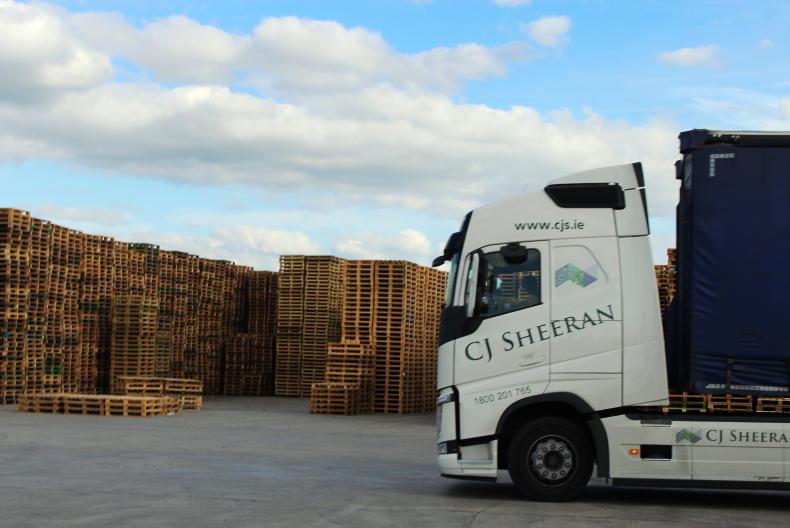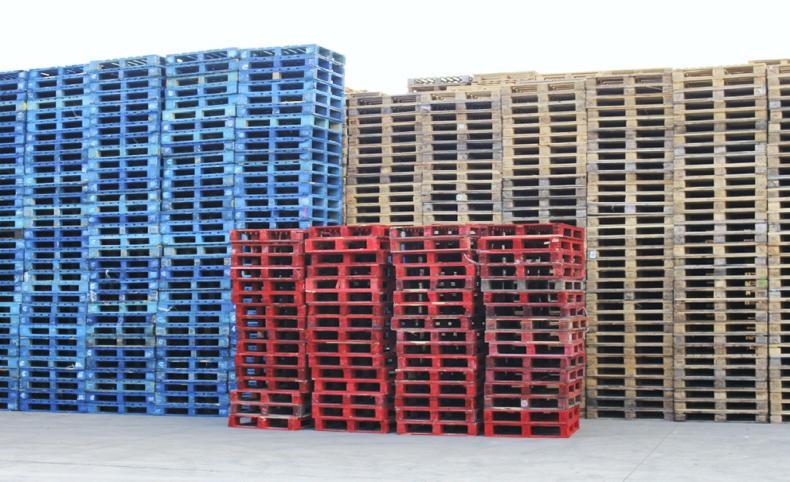It’s two years this month since the CJ Sheeran Group – based in Mountrath – acquired Coolrain Sawmills, five miles to the southeast on the foothills of the Slieve Bloom Mountains in Co Laois.
It seems like a lifetime ago now but things looked positive in November 2020 when the Taoiseach Micheál Martin announced the easing of Covid-19 but within a few weeks the number of cases rose dramatically and the Government had no choice but to put the country into Level 5 lockdown once again.
Many businesses suffered during this period but forestry operated throughout Covid-19. While the timber processing sector was hit in tandem with the construction sector, the pandemic had a silver lining for pallet production.
Pallets, essential for the transport of goods especially food and pharmaceuticals, saw record growth during the pandemic, which CJ Sheeran has capitalised on.
While both the Mountrath and Coolrain mills are synonymous with the timber industry in Co Laois, the Sheeran reach extends much further than the county boundary. In addition to its three mills in Laois, it has five other plants in Castlepollard, Co Westmeath; Ballinrobe, Co Mayo; Cootehill, Co Cavan; and two in Dublin.
The group is a major employer with 320 staff on its payroll, and hundreds of other jobs created in harvesting and the service areas.
Earlier this year, during a field day organised by the Association of Irish Forestry Consultants (AIFC), Mark Sheeran, MD, provided a guided tour of the group’s mills in Coolrain and Mountrath.
“The purchase of Coolrain provided us with direct access to log suppliers – both Coillte and private,” he said. Despite the felling licence issue he said the group is sourcing sufficient logs.
“We also buy in sawn timber from Irish sawmills,” he added, pointing to some well-known brands in the yard.
While pallet production is the main topic, the mills process and manufacture a wide range of products including construction timber, doors, gates, fencing products including post and rail, round posts, trellis, shiplap and gate posts, along with a staggering 192 products in the garden-leisure range.
Mark said that the UK market which purchases a high proportion of fencing material remains strong despite Brexit. In Coolrain, “six loads of timber leave this sawmill every day for the UK and while there is more paperwork since Brexit, it hasn’t put the brakes on the market”.
He emphasised the role of the company in ensuring there is no waste in its drive towards carbon neutrality.
Residue market
“There is a good residue market for bark mulch which we grade into different products and markets” he said.
The company’s bark mulch ends up in outlets such as Lidl and Aldi via Bord na Móna. “We are constantly exploring new and different grades of bark mulch as an alternative for peat.”
However, it is difficult to escape the subject of pallet production which is the core business of CJ Sheeran. The group is an international-scale manufacturer of pallets and packaging which Sheeran says is due to a strong emphasis on the quality of the product and traceability as every pallet has a unique Sheeran stamp that can be traced back to Mountrath and its other plants.
“Pallets have to be manufactured for a wide range of countries and serve different industries,” he said.
“Dairy products need different pallets from IT, which again differ from pharmaceuticals.”

Long-time CJ Sheeran employee
Michael Fitzpatrick with Mark Sheeran.
Most of the group’s customers export their products so the pallets need to meet Irish and international standards. In this regard, customers not only demand traceability but also sustainability, he said. “They need evidence that our carbon footprint is low, which is why we are aiming for carbon neutrality.”
Wise decisions
The company has made some wise decisions on renewable energy over the years which has helped the net zero goal.

In addition to supplying the Irish market, six loads of timber products leave CJ Sheeran every day for the UK. \ Donal Magner
“We once considered gas heating for the kilns but opted instead for wood chips,” said Brian Fingleton, group compliance manager.
“We use up to 40 tonnes of chips per week to heat seven kilns and this will increase as a new kiln is under construction,” he explained. “Now, 72% of the energy we are using is renewable, mostly in biomass.”
He carries out lifecycle assessments (LCA) on all aspects of the company’s carbon footprint performance down to individual pallets.
The new pallet manufacturing plant in Mountrath produces 30,000 pallets each week, which is matched by the group’s factory in Ballinrobe, while total capacity is 80,000. A further 30,000 pallets are reconditioned in the nearby Mountrath recycling factory. Pallet recycling offers savings to customers and adds to the carbon storage as “pallets can come back for recycling several times” said Sheeran.

Pallets about to be recycled – vegetable dyes are used to indicate different markets and stage of recycling. Blue indicates recycling is over so these pallets will be pulped for equine bedding, compost or renewable energy. \ Donal Magner
When their end life eventually comes they are shredded and can be used for equine bedding, garden mulch or chipped for biomass energy.
He believes in continuous investment in mill technology including the installation of a new grading line in Coolrain.
He is also upgrading the pallet recycling plant in Mountrath to include the installation of automated robotic technology.
He said this will improve efficiency and productivity but there is also a human element in this investment.
“The manual pallet reconditioning work is the toughest part of the mill as the pallets are heavy to handle and the work is monotonous,” he said. The new automated plant will remove this element of pallet recycling.
The emphasis throughout is on quality and sustainability. Quality is acknowledged in the group’s achievement of three International Organisation for Standardisation (ISO) brands and Wood Fuel Quality Assurance (WFQA) certification.
The group has Forest Stewardship Council (FSC) chain of custody certification, which demonstrates that its timber is sourced from sustainably managed forests.
It’s two years this month since the CJ Sheeran Group – based in Mountrath – acquired Coolrain Sawmills, five miles to the southeast on the foothills of the Slieve Bloom Mountains in Co Laois.
It seems like a lifetime ago now but things looked positive in November 2020 when the Taoiseach Micheál Martin announced the easing of Covid-19 but within a few weeks the number of cases rose dramatically and the Government had no choice but to put the country into Level 5 lockdown once again.
Many businesses suffered during this period but forestry operated throughout Covid-19. While the timber processing sector was hit in tandem with the construction sector, the pandemic had a silver lining for pallet production.
Pallets, essential for the transport of goods especially food and pharmaceuticals, saw record growth during the pandemic, which CJ Sheeran has capitalised on.
While both the Mountrath and Coolrain mills are synonymous with the timber industry in Co Laois, the Sheeran reach extends much further than the county boundary. In addition to its three mills in Laois, it has five other plants in Castlepollard, Co Westmeath; Ballinrobe, Co Mayo; Cootehill, Co Cavan; and two in Dublin.
The group is a major employer with 320 staff on its payroll, and hundreds of other jobs created in harvesting and the service areas.
Earlier this year, during a field day organised by the Association of Irish Forestry Consultants (AIFC), Mark Sheeran, MD, provided a guided tour of the group’s mills in Coolrain and Mountrath.
“The purchase of Coolrain provided us with direct access to log suppliers – both Coillte and private,” he said. Despite the felling licence issue he said the group is sourcing sufficient logs.
“We also buy in sawn timber from Irish sawmills,” he added, pointing to some well-known brands in the yard.
While pallet production is the main topic, the mills process and manufacture a wide range of products including construction timber, doors, gates, fencing products including post and rail, round posts, trellis, shiplap and gate posts, along with a staggering 192 products in the garden-leisure range.
Mark said that the UK market which purchases a high proportion of fencing material remains strong despite Brexit. In Coolrain, “six loads of timber leave this sawmill every day for the UK and while there is more paperwork since Brexit, it hasn’t put the brakes on the market”.
He emphasised the role of the company in ensuring there is no waste in its drive towards carbon neutrality.
Residue market
“There is a good residue market for bark mulch which we grade into different products and markets” he said.
The company’s bark mulch ends up in outlets such as Lidl and Aldi via Bord na Móna. “We are constantly exploring new and different grades of bark mulch as an alternative for peat.”
However, it is difficult to escape the subject of pallet production which is the core business of CJ Sheeran. The group is an international-scale manufacturer of pallets and packaging which Sheeran says is due to a strong emphasis on the quality of the product and traceability as every pallet has a unique Sheeran stamp that can be traced back to Mountrath and its other plants.
“Pallets have to be manufactured for a wide range of countries and serve different industries,” he said.
“Dairy products need different pallets from IT, which again differ from pharmaceuticals.”

Long-time CJ Sheeran employee
Michael Fitzpatrick with Mark Sheeran.
Most of the group’s customers export their products so the pallets need to meet Irish and international standards. In this regard, customers not only demand traceability but also sustainability, he said. “They need evidence that our carbon footprint is low, which is why we are aiming for carbon neutrality.”
Wise decisions
The company has made some wise decisions on renewable energy over the years which has helped the net zero goal.

In addition to supplying the Irish market, six loads of timber products leave CJ Sheeran every day for the UK. \ Donal Magner
“We once considered gas heating for the kilns but opted instead for wood chips,” said Brian Fingleton, group compliance manager.
“We use up to 40 tonnes of chips per week to heat seven kilns and this will increase as a new kiln is under construction,” he explained. “Now, 72% of the energy we are using is renewable, mostly in biomass.”
He carries out lifecycle assessments (LCA) on all aspects of the company’s carbon footprint performance down to individual pallets.
The new pallet manufacturing plant in Mountrath produces 30,000 pallets each week, which is matched by the group’s factory in Ballinrobe, while total capacity is 80,000. A further 30,000 pallets are reconditioned in the nearby Mountrath recycling factory. Pallet recycling offers savings to customers and adds to the carbon storage as “pallets can come back for recycling several times” said Sheeran.

Pallets about to be recycled – vegetable dyes are used to indicate different markets and stage of recycling. Blue indicates recycling is over so these pallets will be pulped for equine bedding, compost or renewable energy. \ Donal Magner
When their end life eventually comes they are shredded and can be used for equine bedding, garden mulch or chipped for biomass energy.
He believes in continuous investment in mill technology including the installation of a new grading line in Coolrain.
He is also upgrading the pallet recycling plant in Mountrath to include the installation of automated robotic technology.
He said this will improve efficiency and productivity but there is also a human element in this investment.
“The manual pallet reconditioning work is the toughest part of the mill as the pallets are heavy to handle and the work is monotonous,” he said. The new automated plant will remove this element of pallet recycling.
The emphasis throughout is on quality and sustainability. Quality is acknowledged in the group’s achievement of three International Organisation for Standardisation (ISO) brands and Wood Fuel Quality Assurance (WFQA) certification.
The group has Forest Stewardship Council (FSC) chain of custody certification, which demonstrates that its timber is sourced from sustainably managed forests.









 This is a subscriber-only article
This is a subscriber-only article











SHARING OPTIONS: